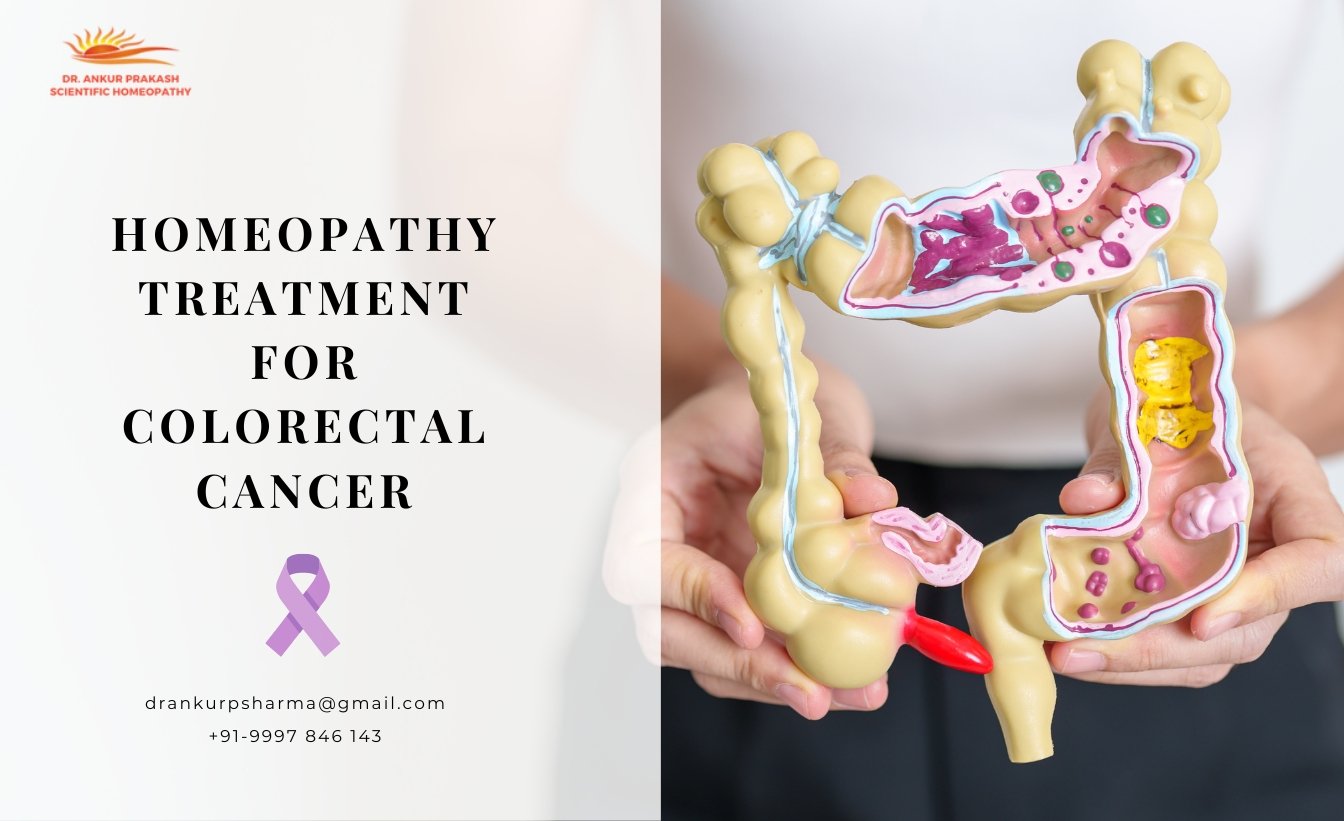Discover how Homeopathy Treatment for Colorectal Cancer, offering holistic care for symptoms and overall wellness. Learn more now. Understanding the complexities of colon cancer is crucial for early detection, effective management, and exploring various treatment options, including homeopathy. This comprehensive guide delves into the essential aspects of this condition, from its symptoms and causes to risk factors and stages, concluding with a focus on homeopathic treatment options.
What Is Colon Cancer?
Colon Cancer, is a malignancy that develops in the colon or rectum, which are integral parts of the digestive system. This form of cancer arises from the uncontrolled growth of abnormal cells in the inner lining of the colon.
The colon plays a pivotal role in processing and eliminating waste from the body. When cancer cells begin to form, they can obstruct the normal functions of the colon, leading to various complications.
Causes Of Colon Cancer
Colorectal cancer, a formidable adversary in the realm of oncology, emerges as a complex interplay of various factors that trigger the uncontrolled growth of cells in the colon or rectum. While it is challenging to pinpoint a single cause for this malignancy, extensive research has shed light on several influential factors that contribute to its development. This comprehensive overview seeks to elucidate the intricate web of causes associated with colorectal cancer.
Reason
1. Genetic Predisposition: A family history of colorectal cancer or certain genetic mutations, such as Lynch syndrome or familial adenomatous polyposis (FAP), can significantly elevate the risk. Individuals with these genetic traits may inherit a predisposition to develop colorectal cancer.
2. Age: Age is a non-modifiable risk factor; the likelihood of developing colorectal cancer increases as one gets older. Most cases are diagnosed in individuals over the age of 50.
3. Lifestyle Choices: Unhealthy lifestyle habits, such as a diet rich in processed meats and low in fiber, excessive alcohol consumption, smoking, and sedentary behavior, are known to increase the risk of colorectal cancer.
4. Inflammatory Bowel Diseases (IBD): Chronic inflammatory conditions of the colon and rectum, such as Crohn’s disease and ulcerative colitis, can raise the risk of developing colorectal cancer over time.
5. Polyps: Precancerous growths called polyps in the colon or rectum can evolve into cancer if not removed promptly during screening or colonoscopy.
6. Diabetes: Individuals with type 2 diabetes are at a slightly higher risk of developing colorectal cancer.
7. Obesity: Excess body weight, particularly around the abdomen, is associated with an increased risk of colorectal cancer.
8. Environmental Factors: Exposure to certain environmental factors, including radiation and some industrial chemicals, may contribute to the development of this cancer.
9. Radiation Exposure: Prolonged exposure to radiation, as seen in some medical treatments, may contribute to the development of colorectal cancer.
Symptoms of Colon Cancer
Altered Bowel Habits: Changes in bowel habits, such as diarrhea or constipation, that persist over an extended period.
Abdominal Discomfort: Persistent discomfort in the abdominal region, often characterized by cramps, gas, or pain.
Incomplete Emptying: A sensation that the bowels do not empty completely after a bowel movement.
Rectal Bleeding: Blood in the stool or rectal bleeding, which can vary in severity.
Unexplained Weight Loss: Significant and unexplained weight loss, which may occur due to cancer-related factors.
Fatigue and Weakness: Persistent fatigue and weakness, sometimes attributed to anemia resulting from bleeding.
Stages Of Colon Cancer
Stage 0: In Situ
At this earliest stage, cancerous cells are confined to the innermost layer of the colon or rectum lining.
No invasion into deeper tissues or nearby lymph nodes has occurred.
Also referred to as carcinoma in situ, it is highly treatable and often curable with surgery.
Stage I: Localized Cancer
Cancer has progressed through the inner layer and may have reached the submucosal.
No invasion into the muscular layers or lymph nodes.
Typically, surgery is the primary treatment, and the prognosis is favorable.
Stage II: Regional Invasion
Cancer has penetrated through the muscular layers of the colon or rectum.
No lymph node involvement.
Surgery remains a primary treatment option, but additional therapies may be considered depending on specific factors.
Stage III: Lymph Node Involvement
Cancer has advanced to nearby lymph nodes but has not spread to distant organs.
Surgery is often combined with chemotherapy to target both the primary tumor and affected lymph nodes.
The risk of recurrence is higher, but treatment can still be curative.
Stage IV: Distant Metastasis
Cancer has spread to distant organs, such as the liver, lungs, or other distant lymph nodes.
Considered advanced or metastatic cancer, it requires a multidisciplinary approach.
Treatment focuses on slowing the cancer’s progression, managing symptoms, and improving the patient’s quality of life.
While stage IV is not typically curable, some patients may experience extended survival with advanced treatments.
Each stage reflects the extent of cancer’s spread and guides treatment decisions. Early detection through regular screenings is essential for diagnosing colorectal cancer at a manageable stage, where curative treatment is more likely.
Exploring Homeopathic Diagnosis for Colon Cancer
Imagine a gentle, natural approach to complement traditional cancer treatments like surgery, chemotherapy, and radiation. That’s precisely what homeopathic treatment offers for colorectal cancer patients. Let’s delve into this topic and learn how homeopathy can play a supportive role in your cancer journey.
What Is Homeopathy?
Homeopathy is a holistic healing system that considers the whole person—body, mind, and emotions. It believes in the body’s ability to heal itself and uses highly diluted natural substances to stimulate the body’s healing processes.
Homeopathy for Colon Cancer
Homeopathy Treatment for Colorectal Cancer. A holistic approach focusing on individualized remedies derived from natural substances. Emphasizes enhancing the body’s natural healing process and addressing specific symptoms of colorectal cancer. Aims to improve overall well-being and quality of life alongside conventional treatments
Complementary Care
Homeopathy is not a standalone treatment for colon cancer but a complementary approach. It can help manage symptoms like nausea, pain, fatigue, and anxiety. Many patients find relief from side effects through homeopathy.
Navigating Colorectal Cancer: The Role of Iscador Therapy
Explore the innovative approach of Iscador Therapy in the treatment of colorectal cancer. This short overview delves into how Iscador, derived from mistletoe extract, is being used as a complementary treatment to enhance the effectiveness of traditional cancer therapies. It highlights the potential benefits of Iscador in boosting the immune system, improving quality of life, and possibly slowing cancer progression. Discover how this natural therapy is providing new hope and options for patients navigating the complexities of colorectal cancer.”
Frequently Asked Questions
What Are the First Symptoms of Colorectal Cancer?
The first symptoms of colorectal cancer can vary, but commonly include changes in bowel habits (like diarrhea or constipation), rectal bleeding or blood in the stool, persistent abdominal discomfort (such as cramps, gas, or pain), a feeling that the bowel does not empty completely, weakness or fatigue, and unexplained weight loss.
Is colorectal cancer painful?
Colorectal cancer may not initially cause pain, especially in the early stages. However, as the disease progresses, it can lead to painful symptoms such as abdominal cramps, discomfort, or pain due to intestinal blockages or other complications related to the cancer’s growth and spread.








